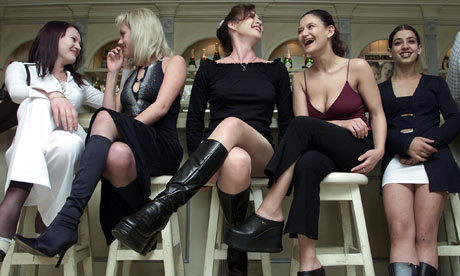Fear of spread of HIV infection among football fans sparks demand for registration of South African prostitutes
Tracy McVeigh and Savious Kwinika The Observer, Sunday 11 October 2009

Prostitutes wait at a bar in a plush northern suburb of Johannesburg, South Africa, Aug 22, 2002. Photograph: Juda Ngwenya/Reuters
Calls are growing for South Africa to legalise prostitution ahead of next year's football World Cup in an effort to limit HIV infection among millions of fans visiting the country for the tournament.
A leading health specialist told the Observer that the World Cup presented a huge risk and said there was an urgent need to start registering prostitutes and screening them for the virus. It is estimated that 50% of the country's sex workers are infected.
Professor Ian Sanne, head of the clinical HIV research unit at Johannesburg's Witwatersrand University, said the party atmosphere being touted by the football authorities, travel companies and the South African government was a green light to alcohol abuse and promiscuity among fans next summer.
Around 3.2 million tickets will be sold for the matches. A million will go to South African residents, with the rest split between international fans and sponsors. Twenty thousand England fans are expected to head for South Africa, where those without tickets will be catered for with huge screens and temporary bars across the country.
Sanne said not only would the visitors be at risk, but young South Africans and the sex workers too, opening the way for the virus to spread at a dramatically increased rate.
"HIV/Aids is a problem globally and there is a great need to encourage and enforce better health and responsibility, especially to the young South Africans who could be at risk during the World Cup," he said.
He called for legal frameworks to regulate the practice of sex workers rather than discriminate against them.
"Interim legalisation of prostitution would be best for the country, rather than leaving it uncontrolled," he said. "Sex workers need to register with a board that will regulate their practice and give certification to practise, but they have to go through a mandatory HIV testing process first, and only those who test negative will be allowed to practise."
South Africa is the centre of the global HIV epidemic, with more than five million adults infected. An estimated one in two of working prostitutes is living with the virus and the lack of medication led to a quarter of a million people dying of Aids-related illnesses there last year. The antiretroviral medication that helps prevent HIV developing into full-blown Aids is being taken by fewer than 30% of those infected.
Infection rates among women aged 15 to 24 declined slightly from 22.1% in 2007 to 21.7% in 2008, but among women in the 30 to 34 age group, the infection rate was 40.4% in 2008.
But while Sanne said authorities should use the World Cup as a platform to raise awareness on the need for testing, Aids/HIV campaigners responded furiously that it would take concern for foreigners rather than its own citizens to make the South African government act.
"The clear way forward to help tackle the tens of thousands of women forced into prostitution through poverty is to legalise it now, not to make it a temporary measure for the World Cup," said Vuyiseka Dubula of the Treatment Action Campaign.
"We need prostitution decriminalised now so we can start to help these women, many of whom have been abused and brutalised from a young age."
Former South African police commissioner Jackie Selebi, now suspended over corruption allegations, caused widespread dismay when he first suggested legalising prostitution and public drinking for the duration of the World Cup, arguing that it would free his officers to deal with security, but the issue is hugely contentious in a country where the sex trade is regarded as immoral and unacceptable.
A spokesman for the FA said: "They [English fans] will all be issued with guidance along with their tickets and we are working now on how best to communicate the dos and don'ts in South Africa to people. But the FA can't be responsible for all the English people travelling to South Africa next summer."
Source: http://www.guardian.co.uk/world/2009/oct/11/legalise-world-cup-sex-trade

No comments:
Post a Comment